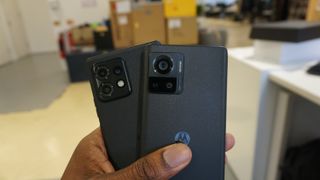Your Motorola phone
If you’ve got a Motorola phone, you’re likely a fan of its clean and simple Android-based user experience, bolstered by the company’s convenient Moto Actions. One other essential built-in feature that you’ll likely want to use frequently is the ability to capture screenshots and there are multiple ways to do this on most Motorola phones.
Whether you're using the powerful Motorola Edge 30 Ultra or the latest (at the time of writing) Motorola Edge 40 Pro, taking a screenshot lets you instantly save what’s on screen and pull it through to process images and text, or simply save what you’ve captured to refer to later. Here’s how to take screenshots on your Motorola phone.
Quick steps to save a screenshot on your Motorola phone
- Hold the power and volume button.
- Take your screenshot.
- Find it in the Photos app.
Step by step guide
Taking a screenshot on an Android phone is a fairly consistent experience, and Google's unified the process for all Android phones. Since Motorola generally sticks to how Google does things, you'll be pleased to know that there's little difference between taking a screenshot on a Motorola phone and taking a screenshot on any other Android phone.
1. Hold the power and volume down button
Unlike iPhones, which make you use the power and volume up button, Android phones have the opposite gesture. Briefly press and hold the power and volume down button at the same time. This will cause the screen to flash, and then a little preview of the image will appear at the lower left-hand corner of the screen.
2. View or edit your screenshot
Tapping that little screenshot will bring the screenshot to the fore of your screen. There, you can make edits to it with the markup tool. This can include cropping the image to focus on what's most important, highlighting certain bits, or even doodling on it. Some Motorola phones are equipped with a stylus. Should you have one of those, that should make this step even easier to pull of.
3. Open the Google Photos app to find your screenshots
Finding the screenshot after you're done editing it can be done by navigating to the Google Photos app. Once there, open the Library tab (at the bottom of the screen) and swipe until you find the screenshots folder.
Backing up a screenshot on your Motorola phone
Unlike iPhones which have a camera roll that integrates screenshots and photos all in one place, some Android phones keep them separate. Particularly, phones that run near-stock builds of Android. It's not a discrete version of Android but rather skews close to Google's idea of what Android should be and thus integrates the Google Photos app as standard.
Though some of the best Android phones come from the likes of Oppo, Xiaomi and Samsung, those phones feature their own dedicated photo/gallery apps, which fold the screenshots into the main photo feed. If you're switching from one of those brands' devices to a Motorola phone (or a Google Pixel) there might be some slight confusion on where screenshots now live.
To find a screenshot with a Motorola phone (as mentioned above), you need to navigate away from the main screen of the Google Photos app and head to the Library section. There, you'll find a screenshots folder, in which is where your newly-captured screenshots should be found. From there, you can now choose to back it up with your camera's own photos by selecting the option from the image's menu, or leave it to linger in half-remembered obscurity, until you get the next best Motorola phone and lose it forever. Dealer's choice.
- Interested in learning how to on your iPhone as well? Here's how to take a screenshot on your iPhone

